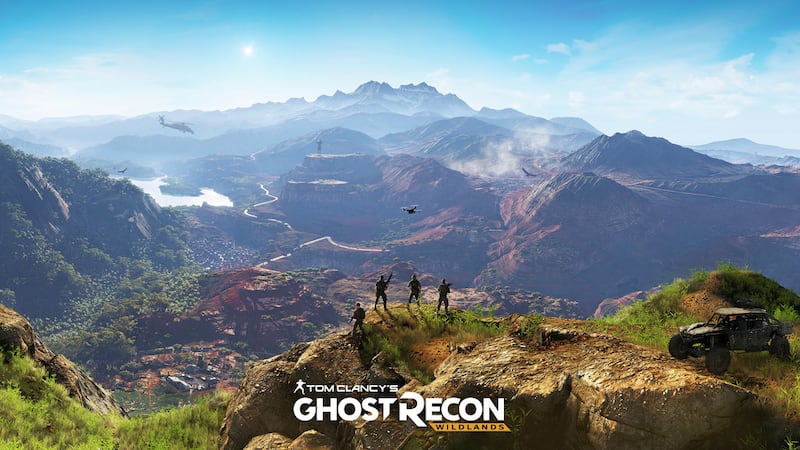A few years back, new video games were stuck in a bit of a rut. It was around the time Ubisoft's Far Cry 3 blasted onto the scene and, with elements lifted from their other series such as Assassin's Creed and Ghost Recon, they all had the same gameplay loop: explore open world/capture outposts/complete missions/level up/win. It's not that this isn't fun, but there's a level of familiarity that has begun to breed contempt. Now we have Ghost Recon: Wildlands, a title that has some of these issues but is opened up enough as to offer something new—just so long as you bring some friends along for the ride.
In Wildlands, there is a nameless military operative from a clandestine group of similar dudes; the best of the best; ghosts, as it were. A high-ranking CIA operative has been killed by a Bolivian drug lord named El Sueño, the ruthless (and hairless) leader of a cartel so brutal, the game tells you how the Bolivian government has struck a "don't kill our guys and we'll look the other way" agreement. Yikes.
Wildlands places you firmly in the shit along with three other soldiers, who can either be inhabited by your real-life friends or controlled by the game's AI. Bolivia is divided into differing biomes such as dense jungle, flat farmlands, craggy mountainous regions blanketed in snow and so on. Each province represents a piece of El Sueño's empire, which Ubisoft has nicely organized into various pieces of the druglord pie. This is to say that each region operates under the purview of a different type of villain, be they a boyfriend-girlfriend torture team, an influential politician, a violent thug with everything to prove and more. With five or six story missions per province and dozens of side quests scattered everywhere, there's a lot to do—or so it seems at first. Yes, it's a blast to jump into Bolivia with a squad of pals and set about aiding the country's rebels, stealing supply choppers or taking over cartel-run outposts, but it can wear thin. Each encounter plays out in basically the same way: send a drone into survey the area, mark bad guys to kill and resources to collect, then go in and—get this—kill the bad guys and collect the resources.
That said, Wildlands provides fun toys to get the job done, such as the aforementioned drone, some pretty nifty thermal vision goggles, myriad guns and attachments and a varied skill tree. By the time you arrive at the meat of the game, however, you've grown weary from leveling up your avatar, and story missions start to blend into one another. It is the very definition of "gameplay loop" which, obviously, is how all games pan out, it's just that the measure of a truly good title is its ability to distract players with worthwhile narrative and fun mechanics. It's not that Wildlands outright fails in this regard, more like the focus was on creating a gigantic world rather than making it feel alive, providing worthwhile recourse when things go wrong or even straying outside the three or four things they do well as proven by other, superior games on their roster.
For players who have buddies with whom they already game and game well, these faults may prove surmountable and there is ultimately a lot of ridiculous fun to be had (we're not talkin' Grand Theft Auto here, but hey—they're the benchmark), but for those who don't have all the time in the world to explore Ubisoft's Bolivia taking down this absurd cartel in piecemeal missions, there are plenty of other titles on the horizon that may come with a better shot at having a good time.

6.5
+Massive world, looks pretty OK, lots of cool guns
-You pretty much have to use stealth, it's long as hell
Ghost Recon: Wildlands
Developer: Ubisoft
Publisher: Ubisoft
Rated M (you will shoot a billion jerks)
Xbox One, PS4, PC (we played the Xbox version)
$59.99-$99.99
(Cool Stuff is a new feature at WW that reviews the best gear and stuff. Our reviewers are experts in their field and are asked to provide honest and independent assessments. When readers choose to purchase our editorial picks, we earn affiliate commissions that support our journalism.)
